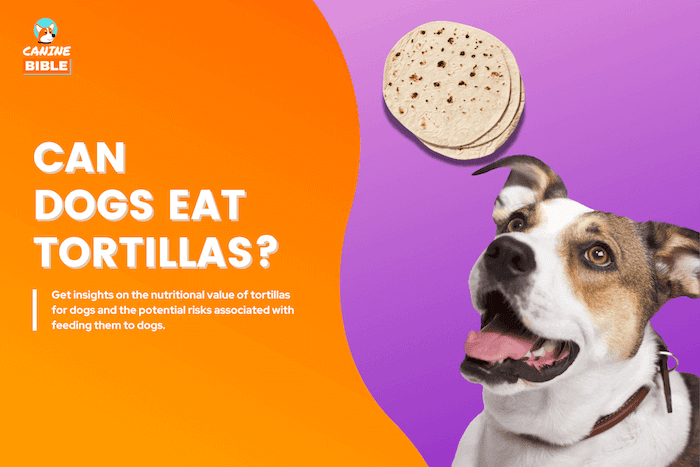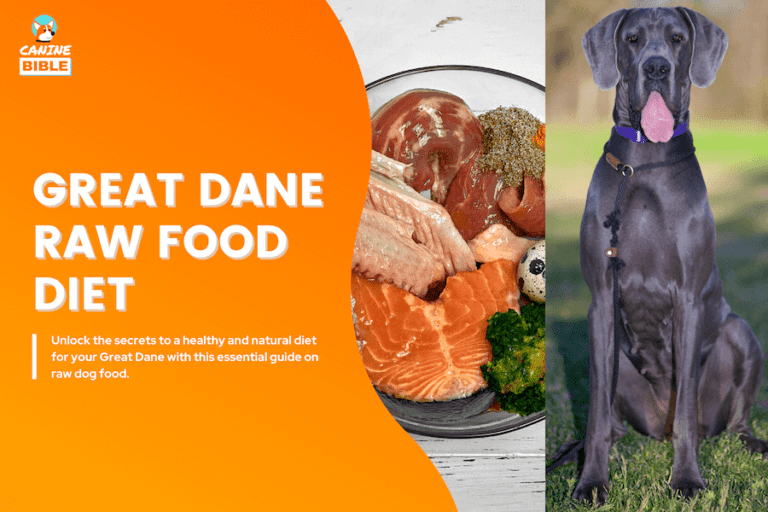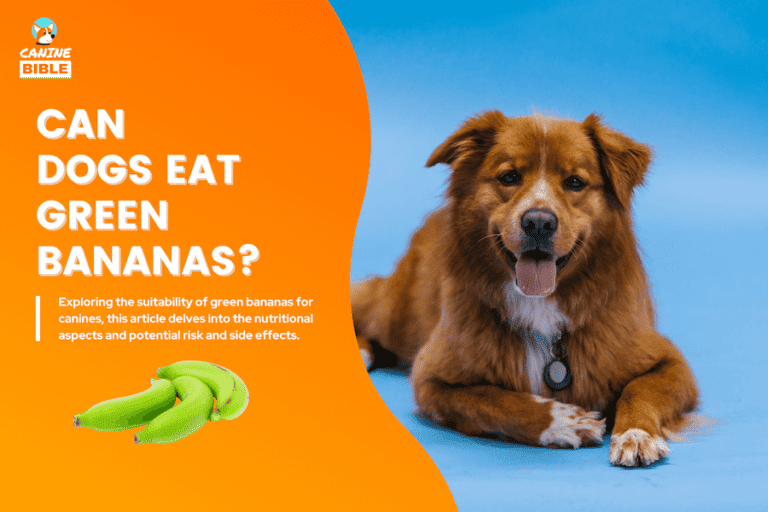Can Dogs Eat Tortillas? Are They Good or Bad? (Flour vs Corn vs Chips)

Canine Bible is reader-supported. We receive affiliate commissions via some of our links. This doesn’t affect rankings. Learn more.
Can dogs eat tortillas made from corn or flour? What about tortilla chips and other tortilla-derived foods? Dogs can occasionally eat one or two tortillas without experiencing any harm. However, tortillas are not recommended due to the high carbohydrate content of flour and corn, which offers no nutritional benefits. Overconsumption of tortillas can lead to rapid weight gain in dogs. It is essential to read the label carefully, as some ingredients in tortillas could potentially be deadly to dogs. Read on to learn all about tortillas and dogs, including the toxic ingredients in processed tortillas you need to avoid, nutrition, health risks, and everything in between.
Are Tortillas Good For Dogs?
Tortillas, traditionally made from corn or flour, are not inherently bad for dogs but are not recommended as a regular part of a dog’s diet. Tortillas can quickly lead to weight gain in dogs. Flour tortillas, in particular, are higher in fat than other types because they are often made with refined wheat flour, lard, or shortening. According to the American Institute for Cancer Research, a 12-inch flour tortilla can contain nearly 300 calories. This is three times more calories than one slice of bread and contains more carbohydrates than three slices of bread.[1]
Tortillas Ingredients: Are They Toxic to Dogs?
We’ve analyzed the most common components of tortillas to determine whether they are safe for dogs.
Can Dogs Eat Tortillas?
Dogs can eat tortillas in very small amounts, but they are not the best option for your pet. We recommend avoiding feeding processed tortillas to dogs. The presence of salt, fats, and preservatives in some tortillas can pose health risks, including sodium ion poisoning and pancreatitis.
Tortillas contain four questionable ingredients: emulsifiers, nixtamalization (cooked corn in calcium hydroxide), amylases, and xylanase (we explained each above). In our research, we found emulsifiers are crucial in the production of many processed foods including tortillas. A study examining the health effects of these emulsifiers on laboratory mice discovered that the mice developed mild gastrointestinal inflammation, increased appetite, and weight gain. Additionally, the study observed elevated blood sugar levels and insulin resistance in the mice.[5] There is evidence that some of these secondary ingredients used in tortillas production can harm animals.
Tortillas lack nutritional value and contain some ingredients not ideal for dogs, so it’s best to avoid feeding them to your pet.
Dogs can eat homemade tortillas in moderation, but even these should be given sparingly. Homemade tortillas might be a slightly better option than store-bought ones because you can control the ingredients and avoid harmful additives like salt, sugar, and preservatives.
Can Dogs Eat Flour Tortillas?
Flour tortillas are the least healthy choice for dogs. They are typically made from finely ground wheat flour, which is not gluten-free. Dogs do not digest grains as efficiently as humans do. If your dog has a sensitive stomach or is allergic to gluten, you should avoid feeding them flour tortillas.
Can Dogs Eat Corn Tortillas?
Corn tortillas are considered whole grains and are generally lower in carbs, calories, and fat than flour tortillas. They are usually made from ground corn, water, and lime (calcium hydroxide), which are not harmful to dogs. Unlike flour tortillas, corn tortillas do not contain gluten, making them a safer option for dogs sensitive to gluten.
Corn tortillas are better for dogs than flour, but that doesn’t mean either is suitable for dogs. For instance, corn kernels can pose a choking hazard to smaller dogs, so it is important to monitor them closely if they consume corn tortillas. Additionally, dogs do not process grains in the same way humans do. Some dogs may exhibit allergic reactions or sensitivities to cereals, so monitoring how they react to such foods is crucial.
We do not recommend corn tortillas as they have added preservatives, like flour tortillas, that are unhealthy for dogs.
Can Dogs Eat Tortilla Chips?
Tortilla chips are not suitable for dogs and should be avoided as a snack. These chips are typically high in salt, which can be dangerous for dogs, potentially leading to sodium ion poisoning with symptoms like vomiting, lethargy, and excessive thirst. Additionally, tortilla chips are often fried, containing unhealthy fats that can contribute to obesity. Many are also seasoned with spices and flavorings that could be harmful to dogs.
Can Dogs Eat Corn Chips?
Corn kernels are the main ingredient in both corn chips and tortilla chips. However, the corn in tortilla chips undergoes nixtamalization, making them milder in taste and smell and more flexible in texture. Also, tortilla chips tend to be larger, thinner, and lower in fat and salt content than corn chips. We do not advise feeding corn chips to dogs.
Are Tortillas Bad For Dogs?
Processed products like tortillas contain many preservatives, toxic ingredients, and artificial ingredients that may harm your dog. Most tortilla chips are loaded with salt, which is unsuitable for dogs. Flour tortillas and corn tortillas are unhealthy for dogs if eaten in excess. Tortillas are also high in calories, with few additional nutrients that can increase a dog’s risk of developing health problems.
Possible Side Effects & Risks of Tortillas In Dogs
The following symptoms may indicate a bad reaction to tortillas
What Should I Do If My Dog Reacted Badly to Tortillas?
If your dog reacts badly to tortillas, you should first stop feeding them the food and remove their access to any more of it. Ensure they have access to fresh water to maintain hydration. It’s important to call your veterinarian if your dog is experiencing any of the symptoms listed above or if you’re concerned about your dog’s condition.
Can’t reach your vet? Contact the Pet Poison Helpline at 1-855-764-7661 or chat live with a veterinary professional via our online vet chat or video chat support (24 hours a day, 7 days a week).
Dogs showing worsening symptoms, such as blood in their vomit or stool, difficulty breathing, weakness, or collapse, should be taken to the veterinarian immediately.
Are Dogs Allergic to Tortillas?
While not common, some dogs may be allergic to tortillas or the ingredients they are made from, such as flour or corn. Symptoms of an allergic reaction can include itching, swelling, hives, and, in severe cases, anaphylaxis, a medical emergency. If you suspect your dog is having an allergic reaction to any food, including tortillas, it is crucial to consult a veterinarian. Your vet can provide appropriate advice and help you formulate a safe diet plan for your dog. We also recommend conducting an at-home dog allergy test to determine if your dog is sensitive or intolerant to certain foods.
Can Puppies Eat Tortillas?
No, puppies should not eat tortillas. Their digestive systems are more sensitive than those of adult dogs, making them more susceptible to the side effects of tortillas, which could lead to more severe reactions.
It’s important to prioritize a well-balanced diet for puppies suitable for their age, size, and breed. This diet should mainly consist of high-quality puppy food and treats specifically formulated to support their growth and development. Introducing human foods, mainly processed or low nutritional value like tortillas, should be avoided to safeguard their health and well-being.
Safer Alternatives to Tortillas For Dogs
Here’s a list of alternatives to tortillas that are safe and nutritious.
Frequently Asked Questions
Conclusion
The bottom line is that you should give your canine food that is beneficial. Flour or corn-based food could disturb your dog’s digestive system. If your dog loves corn or wheat flour-based foods, there are several better options than tortillas, especially if they are made with corn or wheat flour. You should never regularly give your dogs flour tortilla chips or corn tortillas. Usually, I eat a few tortillas, and it worries me that my dog may inadvertently eat a whole bag of flour. It is much safer to give him a tasty treat made for dogs.
Like It? Subscribe & Share!
Sources
Canine Bible uses only high-quality sources, including peer-reviewed studies, to support the facts within our articles. Read our editorial process and product review methodology to learn more about how we fact-check, test products, and keep our content accurate, reliable, and trustworthy.
- American Institute For Cancer Research
- ScienceDirect
- Healthline
- Encyclopedia of Food Sciences and Nutrition
- Nature
Canine Bible authorship represents the unified voice of our entire editorial team and our in-house veterinarians rather than a single author. Each article, blog post, and review published under the Canine Bible name undergoes a rigorous review process, involving all team members to guarantee accuracy and up-to-date in accordance with the latest veterinarian research. This collaborative effort is an integral part of our editorial process and aligns with our four pillars of content creation. This approach ensures our content is backed by expert knowledge and factual information, offering our readers reliable, actionable, and trustworthy content.




![Homemade Raw Dog Food: Easy BARF Diet Recipes [Vet Approved]](https://www.caninebible.com/wp-content/uploads/2021/04/homemade-raw-dog-food-recipes-768x512.png)
![Best Shih Tzu Homemade Dog Food Recipes: Puppy & Adult [Guide]](https://www.caninebible.com/wp-content/uploads/2023/08/Shih-Tzu-Homemade-Dog-Food-1-768x512.png)

